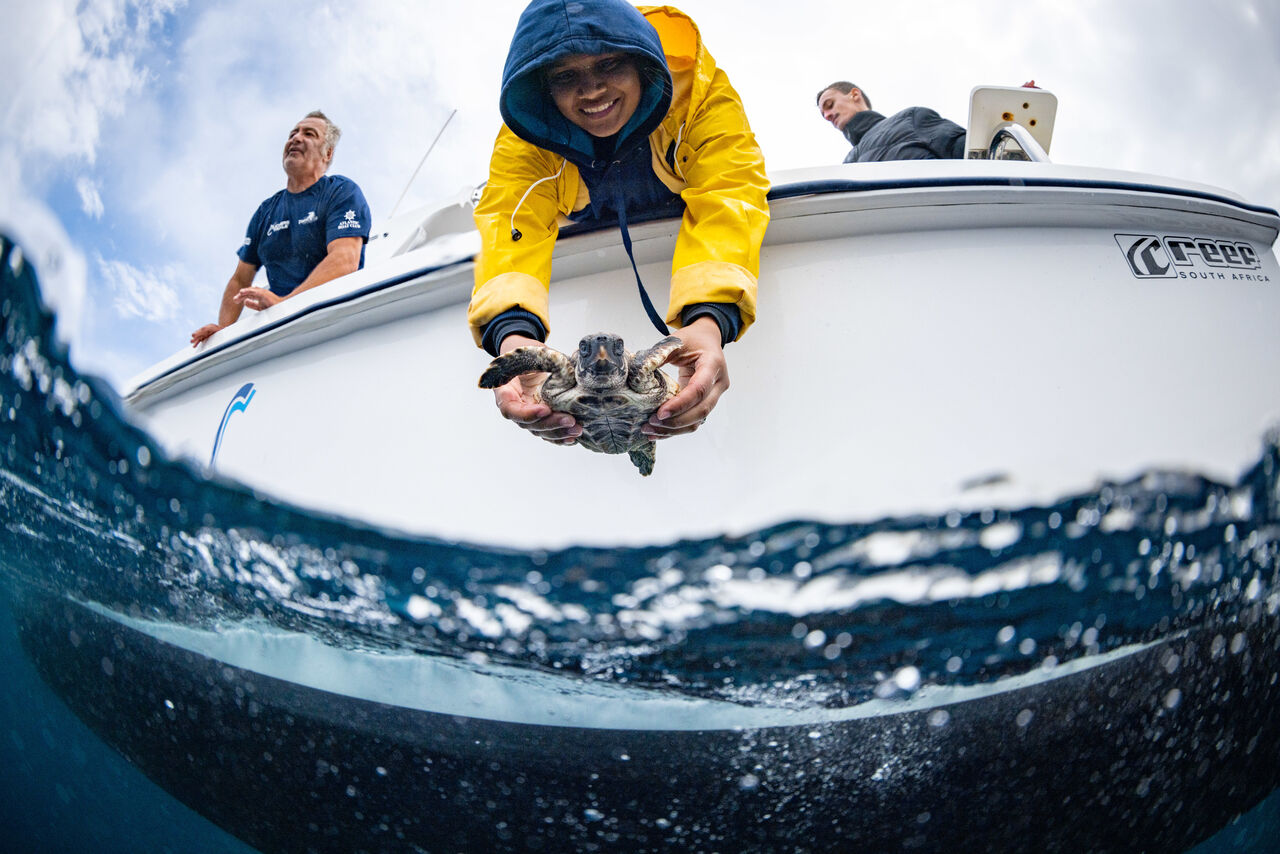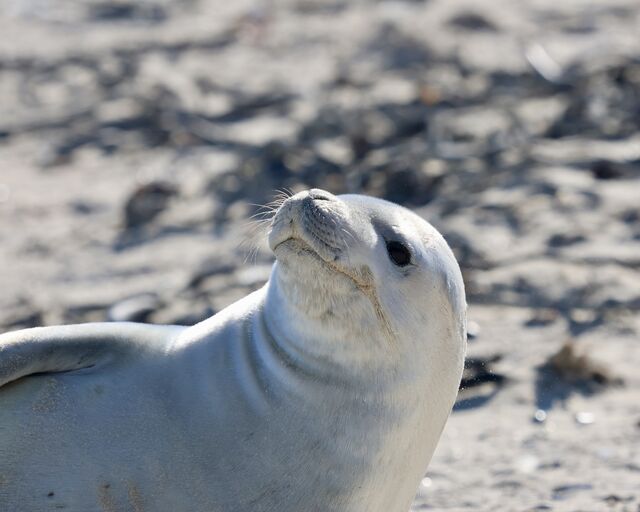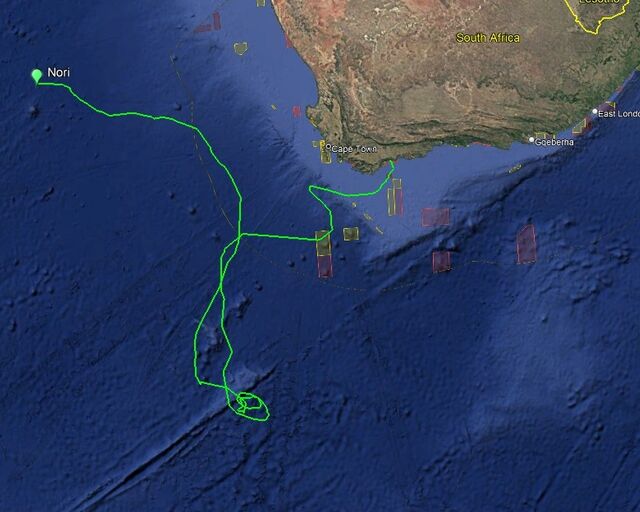The sea turtle rehabilitation team of the Two Oceans Aquarium Foundation released 69 rehabilitated turtles approximately 45 nautical miles south of Hout Bay on 12 December 2022. The turtles were all rehabilitated at the Two Oceans Aquarium over the last year after being found stranded on Western Cape beaches. The group that was released included 65 hatchlings, one hawksbill, and three green turtles.
Turbo returns to the ocean - with a satellite tag! Credit: Zandile Ndhlovu
After months of rehabilitation, the turtles were cleared for release by the vet, some tagged with satellite tags to enable the animals to be tracked and others with microchips, similar to those used in house pets. On the morning of the release, all the turtles were packed into travel crates, transported to Hout Bay harbour and loaded onto two boats. The team and crew headed out for roughly 45 nautical miles to encounter the warmer currents that can be found south of Cape Town during summer. Once these temperate waters were reached, the turtles were released into 19.5°C blue water to the great joy and jubilation of all on board.
“It’s always a terrifying thrill to release our turtles! Release is the ‘why’ for all the work we do – turtles belong in their ocean home – but it’s also terrifying because humans have made their home unsafe,” says Talitha Noble, Two Oceans Aquarium Foundation’s Conservation Manager. “With each turtle released, the importance of taking action towards protecting the ocean is cemented deeper”.
Which turtles were released?
Post-hatchling loggerhead turtles
There were 157 hatchling strandings this year, of which 40 were sent to uShaka Marine World earlier in the year. Sixty-five of the post-hatchling loggerhead turtles at the Two Oceans Aquarium were cleared for release, while some of the smaller turtles needing extra care remained in the rehabilitation programme.
Credit: Zandile Ndhlovu
In addition to sponsoring the sea turtle rescue, rehabilitation, and release programme, Ardagh Glass Packaging - Africa (AGP – Africa, formerly Consol Glass) adopted two of the turtle hatchlings which were among those released back into the ocean. Amber arrived at the Aquarium on 9 April 2022, having stranded on Witsand near Misty Cliffs. They weighed just 68g on arrival and had grown to 789g upon release. Emerald, weighing 73g and covered in volcano barnacle hitchhikers, was rescued from Struisbaai, close to the most southern point of Africa and a hotspot for stranded hatchlings. Emerald was released back into the wild weighing 590g.
The hatchlings made steady progress while in the rehabilitation programme. Over the year, they ate nearly 100kg of gel cubes, which consist of a nutritious blend of gelatine, vegetables, shellfish, fish and supplements. The 65 released hatchlings were of healthy weight, between 200g and 700g. Oceans Alive adopted 20 hatchlings this season.
Credit: Sacha Specker
Four sub-adult turtles were successfully released
Juniper, a hawksbill turtle, was rescued in September 2022 in Mosselbay by SMART. Juniper recovered quickly from pneumonia and was ready for release.
Credit: Zandile Ndhlovu
Kijani, which means ‘green’ in Swahili, is a green turtle who was rescued at the end of July 2022 in Paternoster by Spilltech. Kijani had pneumonia but healed quickly and was well enough to be housed in the I&J Ocean Exhibit for the last month prior to release. The rehabilitation of this special turtle was sponsored by John Dory’s Zero Waste Initiative.
Credit: Sacha Specker
Turbo, a green turtle, arrived in September 2021 from De Hoop Nature Reserve. She had an abscess on her neck that took months to heal, giving her time to gain 10kg in rehab. Turbo’s satellite tag was sponsored by GreenFish.
Basil, the third green turtle, arrived one month ago from Arniston in excellent body condition and without injury. Fortunately, the Aquarium was just a pitstop for Basil.
Loggerhead turtles nest on northern KwaZulu-Natal beaches
Loggerhead turtles nest on northern KwaZulu-Natal beaches, and the eggs hatch in December and January every year. Once hatched, the tiny turtles make their way into the Indian Ocean and start to drift with the Agulhas Current. The Current carries them south towards Cape Town. Near Struisbaai, the Current doubles back on itself, heading north again. Along the way, and at the Current’s turning point, strong winds and rough seas push some of the tiny turtles into the colder surrounding waters. Being reptiles, their body temperatures adjust to ambient water temperature, so the cold water causes the turtles to go into cold shock and hypothermia. These compromised and often injured little turtles are expelled onto the beaches, where they are found by concerned members of the public and brought to the Two Oceans Aquarium for specialised care and rehabilitation.
Credit: Sacha Specker
Juvenile and sub-adult sea turtles are also rehabilitated
Juvenile and sub-adult sea turtles are also admitted to the rehabilitation programme. Unlike the post-hatchlings that are often found stranded in concentrated areas, juvenile and sub-adult sea turtles strand all along the Western Cape beaches. The turtles are given appropriate medical care and fed a specialised diet until they are cleared for release. Rehabilitation can take a couple of months or even years. Five of the seven turtle species found worldwide have been rehabilitated by the Two Oceans Aquarium Foundation’s Turtle Conservation Centre.
Credit: Zandile Ndhlovu
Turtle rehabilitation at the Two Oceans Aquarium
Each year, the Two Oceans Aquarium Foundation’s Turtle Conservation Centre receives a number of sea turtles that strand along the Western Cape coastline. These turtles range in weight, from a couple of grams to several kilogrammes. They all receive rehabilitation treatment for various injuries and illnesses – from external wounds and dehydration to hypothermia and infection. Many of the turtles also present intestinal problems which often can be attributed to the ingestion of plastic. 62% of the post-hatchlings brought in for rehabilitation this year had ingested plastic, with a total of 618 pieces being passed.
Credit: Zandile Ndhlovu
After months of specialised medical care, including wound treatments, antibiotics, x-rays, tube feeding, specialised diets, and in some cases MRIs, the turtles are cleared for release. The release is purposely done during peak summer when the warmer waters of the Indian Ocean push closer to the coast of Hout Bay. By releasing the turtles in this area, they can join the warmer current again and continue with their life at sea. The larger turtles are fitted with satellite tags before release so that the rehabilitation team can track them.
Credit: Martine Viljoen
Which turtles were not released?
Even after months of rehabilitation, some of the sea turtles are not healthy enough to be released. Although 69 turtles were released, several others remain in the rehabilitation programme. These include seven post-hatchling loggerhead, three hawksbill, five green and two loggerhead turtles. Nobomvu, one of the loggerhead turtles, remains in our care. Bob, a green turtle that has been at the Aquarium since 2014, is still undergoing rehabilitation but is expected to be released early in 2023.
Bob’s story of overcoming severe illness and the ingestion of plastic inspires many. An incredible ambassador, Bob has drawn significant attention to the human-induced plastic crisis which threatens the global sea turtle population. Unfortunately, the ocean is not safe for sea turtles, and released turtles will face many of the threats which caused their stranding in the first place. #TheFlipperEffect is a testament to Bob’s impact: this movement to protect sea turtles drives plastic awareness and respect for the ocean.
Bob the green turtle is on his rehab path to release too.


